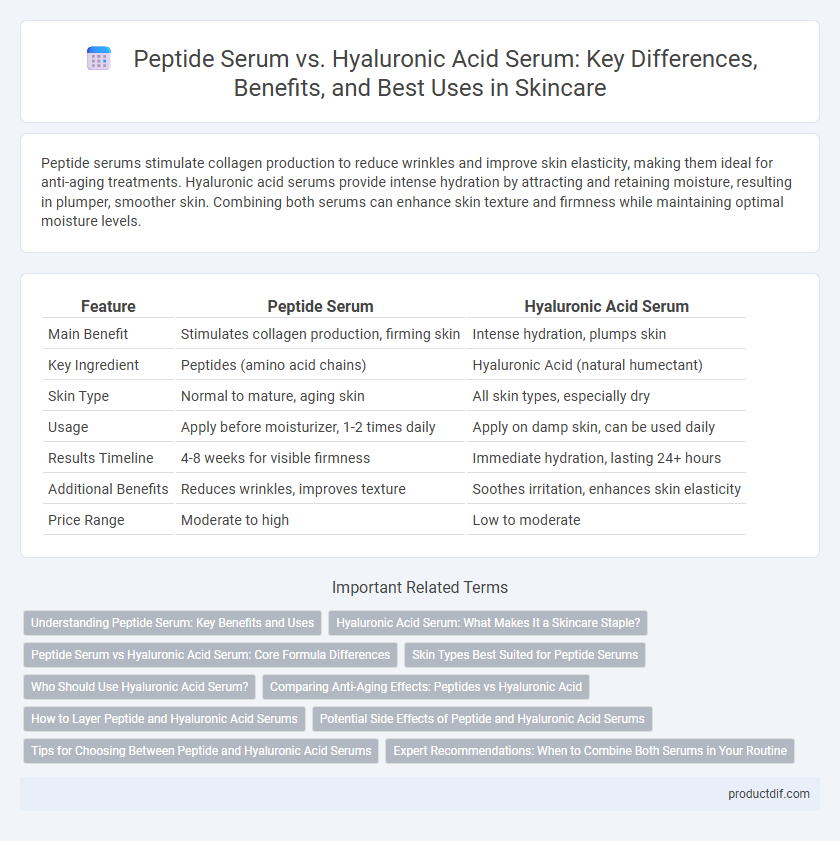Peptide serums stimulate collagen production to reduce wrinkles and improve skin elasticity, making them ideal for anti-aging treatments. Hyaluronic acid serums provide intense hydration by attracting and retaining moisture, resulting in plumper, smoother skin. Combining both serums can enhance skin texture and firmness while maintaining optimal moisture levels.
Table of Comparison
| Feature | Peptide Serum | Hyaluronic Acid Serum |
|---|---|---|
| Main Benefit | Stimulates collagen production, firming skin | Intense hydration, plumps skin |
| Key Ingredient | Peptides (amino acid chains) | Hyaluronic Acid (natural humectant) |
| Skin Type | Normal to mature, aging skin | All skin types, especially dry |
| Usage | Apply before moisturizer, 1-2 times daily | Apply on damp skin, can be used daily |
| Results Timeline | 4-8 weeks for visible firmness | Immediate hydration, lasting 24+ hours |
| Additional Benefits | Reduces wrinkles, improves texture | Soothes irritation, enhances skin elasticity |
| Price Range | Moderate to high | Low to moderate |
Understanding Peptide Serum: Key Benefits and Uses
Peptide serum stimulates collagen production, promoting skin elasticity and reducing fine lines for a firmer, youthful complexion. Its amino acid chains enhance cell regeneration, improve skin texture, and support barrier function, making it ideal for anti-aging routines. Regular application of peptide serum targets wrinkles and uneven tone, complementing hydration-focused treatments like hyaluronic acid serum for comprehensive skincare.
Hyaluronic Acid Serum: What Makes It a Skincare Staple?
Hyaluronic acid serum stands out in skincare due to its unparalleled ability to retain moisture, holding up to 1,000 times its weight in water, which boosts skin hydration and plumpness. Its lightweight, non-greasy formula makes it suitable for all skin types, promoting a smoother and more youthful complexion. Clinical studies highlight hyaluronic acid's effectiveness in enhancing skin barrier function and reducing fine lines, solidifying its status as a skincare staple.
Peptide Serum vs Hyaluronic Acid Serum: Core Formula Differences
Peptide serum contains short chains of amino acids that stimulate collagen production and improve skin elasticity, while hyaluronic acid serum utilizes a powerful humectant molecule to retain moisture and plump the skin. Peptides target anti-aging by promoting cellular repair, whereas hyaluronic acid primarily hyditates and smooths the skin surface. The core formula difference lies in peptides' role as bioactive compounds enhancing skin regeneration, contrasted with hyaluronic acid's function as an intensive hydrator maintaining skin moisture balance.
Skin Types Best Suited for Peptide Serums
Peptide serums are best suited for aging or mature skin types due to their ability to stimulate collagen production and reduce fine lines. They benefit sensitive and dry skin by enhancing skin barrier repair without causing irritation. In contrast, hyaluronic acid serums excel in providing intense hydration for all skin types but may be especially effective for dehydrated or combination skin.
Who Should Use Hyaluronic Acid Serum?
Hyaluronic Acid Serum is ideal for individuals with dry or dehydrated skin seeking intense hydration and improved skin elasticity. It effectively attracts and retains moisture, making it suitable for all skin types, especially those prone to dullness or fine lines. People with sensitive or aging skin benefit from its gentle, non-irritating formula that promotes a plump and youthful complexion.
Comparing Anti-Aging Effects: Peptides vs Hyaluronic Acid
Peptide serums stimulate collagen production, enhancing skin elasticity and reducing fine lines for long-term anti-aging benefits, while hyaluronic acid serums primarily provide intense hydration and plumpness, diminishing wrinkle visibility by retaining moisture. Peptides actively repair cellular damage and support skin regeneration, making them effective for decreasing deeper wrinkles and improving skin firmness. Hyaluronic acid boosts immediate skin volume and smoothness but lacks the collagen-stimulating properties peptides offer for sustained anti-aging effects.
How to Layer Peptide and Hyaluronic Acid Serums
When layering peptide and hyaluronic acid serums, apply the hyaluronic acid serum first to hydrate and plump the skin, as it attracts and retains moisture effectively. Follow with the peptide serum, which supports collagen production and skin repair for enhanced elasticity and firmness. This sequence maximizes absorption and optimizes the combined benefits of hydration and anti-aging.
Potential Side Effects of Peptide and Hyaluronic Acid Serums
Peptide serums may cause mild irritation or allergic reactions in sensitive skin due to their active amino acid compounds, while hyaluronic acid serums are generally well-tolerated but can sometimes lead to dryness or redness if overused or applied in low-humidity environments. Both serums have low risk profiles, but users with sensitive or reactive skin should conduct patch tests to minimize adverse effects. Understanding ingredient concentration and skin type compatibility is crucial to avoiding negative reactions from these popular cosmetic treatments.
Tips for Choosing Between Peptide and Hyaluronic Acid Serums
When selecting between peptide serum and hyaluronic acid serum, consider your skin's specific needs: peptide serums boost collagen production for anti-aging benefits, while hyaluronic acid serums excel at intense hydration and plumping. Evaluate your skin type, as hyaluronic acid suits dry or sensitive skin, whereas peptide serums target fine lines and elasticity issues. For optimal results, combining both serums in a skincare routine can enhance skin texture and moisture retention.
Expert Recommendations: When to Combine Both Serums in Your Routine
Experts recommend combining peptide serum and hyaluronic acid serum when targeting both skin hydration and anti-aging benefits, as peptides stimulate collagen production while hyaluronic acid locks in moisture. Applying the hyaluronic acid serum first helps create a hydrated base, allowing the peptide serum to penetrate more effectively for enhanced skin repair. This dual approach is especially advised for mature or dry skin types seeking to improve elasticity and plumpness simultaneously.
Peptide Serum vs Hyaluronic Acid Serum Infographic

 productdif.com
productdif.com